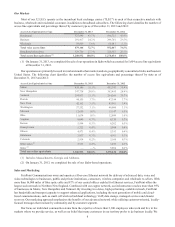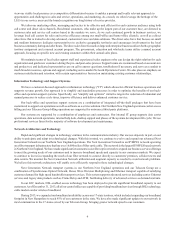FairPoint Communications 2013 Annual Report Download - page 20
Download and view the complete annual report
Please find page 20 of the 2013 FairPoint Communications annual report below. You can navigate through the pages in the report by either clicking on the pages listed below, or by using the keyword search tool below to find specific information within the annual report.18
vacated portions of the FCC’s December 21, 2010 Report and Order in the Manner of Preserving the Open Internet (GN Docket
09-191) (the "Open Internet Order"). In its decision, the DC Court vacated the FCC's anti-blocking and anti-discrimination rule
related to Internet Service Providers, finding the FCC had exceeded its authority in the Open Internet Order. We do not anticipate
that this decision will impact our provision of Internet services; however, we cannot predict what impact, if any, this may have on
our business, financial condition, results of operations, liquidity and/or the market price of our outstanding securities. The FCC
has preempted some state regulation of VoIP.
Additional rules and regulations may be extended to the Internet and to broadband Internet access. A variety of proposals
are under consideration in both federal and state legislative and regulatory bodies. For example, the FCC is considering reclassifying
the transport component of broadband service as a "telecommunications service." In addition, there has been increasing activity
to increase regulatory oversight of third party billing on telephone bills and on cyber-security. We cannot predict whether the
outcome of pending or future proceedings will prove beneficial or detrimental to our competitive position and our regulatory
compliance costs.
State Regulation
The local service rates and intrastate access charges of substantially all of our telephone subsidiaries are regulated by state
regulatory commissions which typically have the power to grant and revoke authority for authorizing companies to provide
communications services. In some states, our intrastate long distance rates are also subject to state regulation. States typically
regulate local service quality, billing practices and other aspects of our business as well. As described above, intrastate access
charges are subject to the transition plan established in the recent CAF/ICC Order.
Most state commissions have traditionally regulated LEC pricing through cost-based rate-of-return regulation. In recent
years, however, state legislatures and regulatory commissions in most of the states in which our telephone companies operate have
either reduced the regulation of LECs or have announced their intention to do so and we expect this trend will continue. Such
relief may take the form of mandatory deregulation of particular services or rates; or it may consist of optional alternative forms
of regulation ("AFOR"), which may involve price caps or other flexible pricing arrangements. Some of these deregulatory measures
are described in greater detail below. We believe that some AFOR plans allow us to offer new and competitive services faster than
under the traditional regulatory regimes.
The following summary addresses significant regulatory actions by regulatory agencies in Maine, New Hampshire and
Vermont that have affected or are expected to affect our Northern New England operations:
Regulatory Conditions to the Merger, as Modified in Connection with the Plan. As required by the Plan, as a condition
precedent to the effectiveness of the Plan, we were required to obtain certain regulatory approvals, including approvals from the
public utility commissions in Maine and New Hampshire and the VPSB. In connection with the Chapter 11 Cases, we negotiated
with representatives of the state regulatory authorities in Maine, New Hampshire and Vermont with respect to (i) certain regulatory
approvals relating to the Chapter 11 Cases and the Plan and (ii) certain changes impacting the Merger Orders. We agreed to
regulatory settlements with the representatives for each of Maine, New Hampshire and Vermont regarding modification of each
state's Merger Order (each a "Regulatory Settlement", and collectively, the "Regulatory Settlements") which were then approved
by the regulatory authorities in those states. The Regulatory Settlements addressed service quality issues, broadband build-out
requirements and certain other financial and management commitments. The commitments agreed to in these proceedings have,
for the most part, been completed, are nearly completed, or are no longer applicable.
New Hampshire Regulatory Settlement. On July 7, 2010, the NHPUC provided its approvals for New Hampshire, including
the Regulatory Settlement for New Hampshire (the "New Hampshire Regulatory Settlement"). Among other requirements, the
New Hampshire Regulatory Settlement imposed obligations on us related to, among other things, retail service quality, broadband
expansion, capital expenditure commitments and various management commitments. Nearly all of these obligations were eliminated
statutorily during fiscal year 2012 upon the New Hampshire legislature's enactment of SB 48. See "—Regulatory Environment—
Legislation for Maine and New Hampshire" herein for more information on SB 48.
With respect to our broadband expansion obligations, in conjunction with the Merger, we agreed to adhere to the broadband
coverage commitments prescribed in the NHPUC’s Order No. 24,823 in Docket DT 07-011; however, the final broadband build-
out commitments were extended to March 31, 2013. In an order dated January 29, 2013, NHPUC approved our proposal to utilize
certain SQI penalties incurred during fiscal years 2009 and 2010 for further broadband expansion and to extend the broadband
build-out commitment deadline to December 31, 2013. Northern New England Telephone Operations LLC advised the NHPUC
of the achievement of the broadband build-out commitment by December 31, 2013 on January 21, 2014.
Maine Regulatory Settlement. On July 6, 2010, the MPUC provided its approvals for Maine, including the Regulatory
Settlement for Maine (the "Maine Regulatory Settlement"). Among other requirements, the Maine Regulatory Settlement imposed
obligations on us related to, among other things, retail service quality, broadband expansion and various management commitments.
























